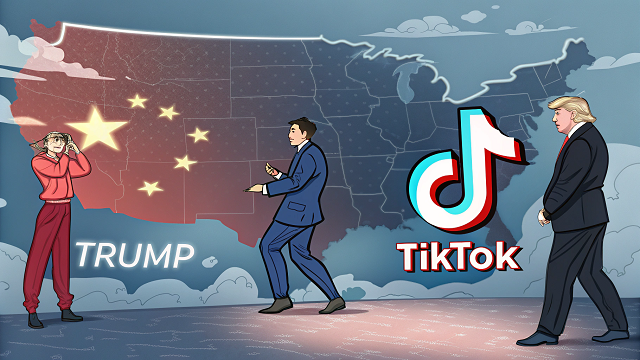TikTok's operations within the United States have been under intense examination since 2017 because of distrust regarding data protection together with ByteDance as its Chinese parent company. The user data access fear of the Chinese government has prompted lawmakers to consider banning or requiring ByteDance to sell its operations.
Trump vs. TikTok: Five Years Later, What’s Next for the App in the U.S.?
The U.S. version of TikTok encountered service disruptions during the last month which led people to question if government agencies were involved. The service returned in short order after the outage revealed both the application's questionable trajectory into the American cultural fabric of online social media. TikTok maintains daily usage from a massive user base which explains why regulatory changes would have significant consequences.
TikTok maintains its value as an important asset by attracting valuable investments from leading financial organizations. The U.S. operations of the platform might reach an estimated value of greater than $60 billion according to analyst predictions. Angelo Zeno from CFRA states that ByteDance has a potential pathway for new American business buyers to emerge in case its American operations end up being forced for sale.
The Biden administration keeps pursuing solutions to national security challenges from TikTok but some politicians advocate stricter oversight actions. Supporters of TikTok claim that any restrictions or bans on the platform would harm the freedom of digital expression and online platform management. The fierce legal and political struggle between ByteDance and the U.S. government demonstrates no sign of easing.
TikTok maintains its leading position within American social media despite ongoing battles regarding its future existence. TikTok's future appears set to change through sales or raised regulations or full prohibition because political strategies intermingle with market dynamics during upcoming months.
TikTok Ban: A Timeline of the Ongoing Battle in the U.S.
TikTok started its legal conflict with the U.S. government through an August 2020 executive order from former President Donald Trump which blocked business transactions with ByteDance. National security concerns pushed the administration to establish a mandatory requirement that required TikTok to sell operations in America to a US company. The executive order established a prolonged legal fight about TikTok access in United States markets.
Microsoft along with Oracle and Walmart declared interest to acquire TikTok operations. A U.S. judge imposed a court order preventing Trump's banning actions thereby granting TikTok permission to continue its operations throughout the legal proceedings. The future of the app stayed uncertain because new efforts and rules frequently appeared.
The political conflict concerning TikTok reached its peak point in 2024 when the House of Representatives passed legislation that focused on blocking the platform. On April 23, 2024 the Senate voted to adopt the same bill and this prompted President Joe Biden to execute legislation which required ByteDance to choose between selling its American TikTok business or facing full shutdown. The new federal law generated increased conflict between TikTok and the political authorities.
TikTok sued the U.S. government because it believed that the government action went against their rights protected by the First Amendment. As a response to security-related allegations ByteDance has both refuted the claims about user data threats and stated its efforts to store data inside U.S. borders.
TikTok struggles to maintain its position in the United States while legal procedures persist. Some individuals advocate that a platform sale could address security issues but many others express concerns about how such a ban would create a risky pattern for digital technology platforms as well as worldwide business links. Multiple critical months will decide whether TikTok can continue its existence in the American market.
Trump Shifts Stance on TikTok Ban as Deadline Looms
Former President Donald Trump appeared against the potential TikTok ban on December 27, 2024 to advocate through legal means against banning the application in the United States. Trump took an unexpected position against banning TikTok even though he had supported restrictions while in office as president.
The U.S. Supreme Court issued its ruling on the Protecting Americans from Foreign Adversaries Act (PAFACA) in January 2025 thus confirming what the general public called the "TikTok ban." The Supreme Court decision about the TikTok ban thrust the company into uncompromising circumstances which forced them to declare plans for leaving the U.S. unless they discovered a suitable resolution.
On January 20, 2025 Trump issued another executive order granting TikTok a 75-day suspension period for the pending ban. TikTok obtained valuable extra time to broker either a sale of U.S. assets or a partnership with United States companies that would keep its operations functioning.
The former president Trump offered to share ByteDance's 50% ownership with an American business to negotiate a compromise. Such a partnership agreement would bridge the national security requirements with keeping the app active in the United States. Experts remain doubtful that such an agreement between TikTok and American firms will actually finalize.
TikTok along with ByteDance and potential American investors attempt to establish mutual terms before the deadline runs out. A lack of settlement between the parties will result in the removal of TikTok access for millions of U.S. users and force the tech industry to handle this historical legal dispute.


